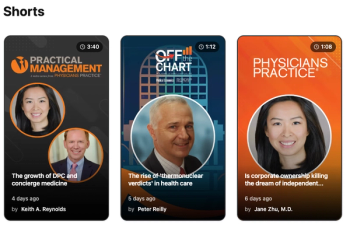
7 Lessons in Launching a Patient & Family Advisory Council
Bringing patients and families with members of your practice in an advisory council can take some work. Here are some lessons from someone who has tried.
A Patient and Family Advisory Council (PFAC) is a group of patients, family members, office staff, and physicians working together to improve the patient experience. CMS' Comprehensive Primary Care Plus (CPC+) multi-payer initiative promotes the opportunity to enhance partnerships with patients and families.
This partnership is built using the PFAC to do so. The PFAC provides a formal means for patients and providers to share information and implement patient- and family-centered changes to make improvements in systems or processes.
In August, our PFAC celebrated its one-year anniversary. As the council coordinator for our group, there was a steep learning curve. There is an art to communicating with your membership, planning meetings, and guiding your group through collaboration. The knowledge and understanding I gained goes beyond evidence-based theories and best practices. A PFAC, as a vehicle for collaboration promoting the patient voice, can be much more than a checked box for CPC+. A successful Patient and Family Advisory Council can serve as a collaborative source of expertise for improving your practice. Patient and family advisors add value when they are encouraged to contribute in meaningful ways. In addition, patients and families gain a better understanding of healthcare systems and become active participants in improving the healthcare experience. It takes strategic planning and awareness. Here are a few lessons learned from my journey in hopes that your PFAC will find a voice and thrive in your practice.
1. Don't be too polished: Patients want to see the human side of you.
Public speaking is not my strength and I often get anxious before a council meeting. When I lead a meeting, my delivery is far from perfect but the passion for a partnership between patients, family members, staff, and physicians comes through. Being human and genuine encourages patient and family advisors to be vulnerable, to share with you, and give you feedback.
2. Speak a common language: Leave the acronyms and abbreviations at the door.
Healthcare is a culture with its own language. Advisors who are unfamiliar with medical terms and abbreviations feel disconnected. They won't stop you to ask what those letters stand for. As time goes by, your patient and family advisors will not know what you are talking about and will not feel comfortable opening up. You don't have to talk down to your advisors, but you do need to take the time to educate advisors and fill in the gaps.
3. Be flexible: Partnering can be messy.
I come to the meeting with a flexible agenda. Our agenda recaps key concepts from the prior meeting and gives an overview of what we would like to discuss and accomplish in the meeting ahead. For this to be a true partnership, we encourage participation and discussion. Sometimes this stalls our progress or leads us in a different direction. It is important to keep in mind that my role is facilitator not lecturer. I have found that a successful partnership includes letting your advisors help guide the journey.
4. Avoid information overload.
Your initial impulse will be to provide your advisors with too many details. To be efficient, you will believe the faster you can get them informed, the sooner you can get to work and improve your practice. It is my experience that you should teach new concepts and strategies in "educational moments." This teaching segment is an opportunity to grow our knowledge in bite size chunks. Give your advisors the information they need so they can contribute. They don't need to be experts on the topic; they need relevant information. If you are overwhelming your partners, you will isolate yourself.
5. Sharing stories is more than an ice-breaker: Take time to listen and learn.
As I tell our PFAC, everyone has a story to tell. Some we celebrate, others we learn from. Author Rachel Remen, MD, Kitchen Table Wisdom: Stories That Heal, says, "Facts bring us to knowledge; stories lead to wisdom." Patients are the experts on their experience. They have a perspective that you need to hear and act on. Transformation is fueled by insight and innovation. Patients will help you transform healthcare, if you let them. Make time for stories at every meeting. Build community, promote trust, and gain wisdom through shared experiences.
6. Transparency is a two-way mirror: Patients will see your practice in a new light.
When you involve patients, you not only hear from them, but they hear from you! Many of our patient and family advisors have commented on having a better understanding of why things are the way they are, what is and isn't realistic, and how much their physicians and practice care about them because of their role on the council.
7. Intentional silence encourages the patient voice
Pause…We don't do this enough. If you pause with intentional silence…borderline an uncomfortable silence…patients will speak. So often communication is about not only the words, but also the silence between words that is important. Take time to pause and allow your patients to respond.
Sharing our experiences helps us to learn from each other. Please share other lessons learned in the comments below.
Keesha Goodnow is the coordinator for the Patient and Family Advisory Council at The Christ Hospital Family Medicine Center in Cincinnati, Ohio. She is a project manager for the University of Cincinnati College of Medicine, Department of Family and Community Medicine, supporting faculty physicians as they equip family medicine residents and geriatric fellows to lead and inspire healthcare transformation in their future practices.
Newsletter
Optimize your practice with the Physicians Practice newsletter, offering management pearls, leadership tips, and business strategies tailored for practice administrators and physicians of any specialty.






